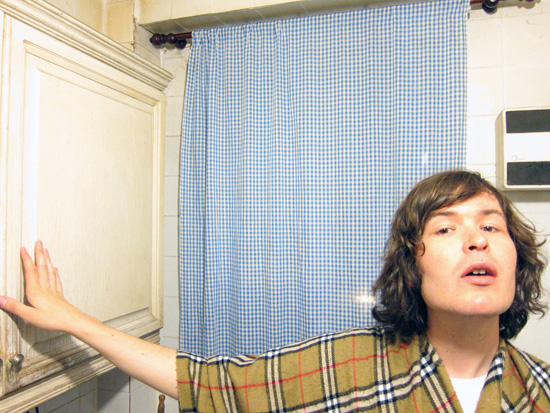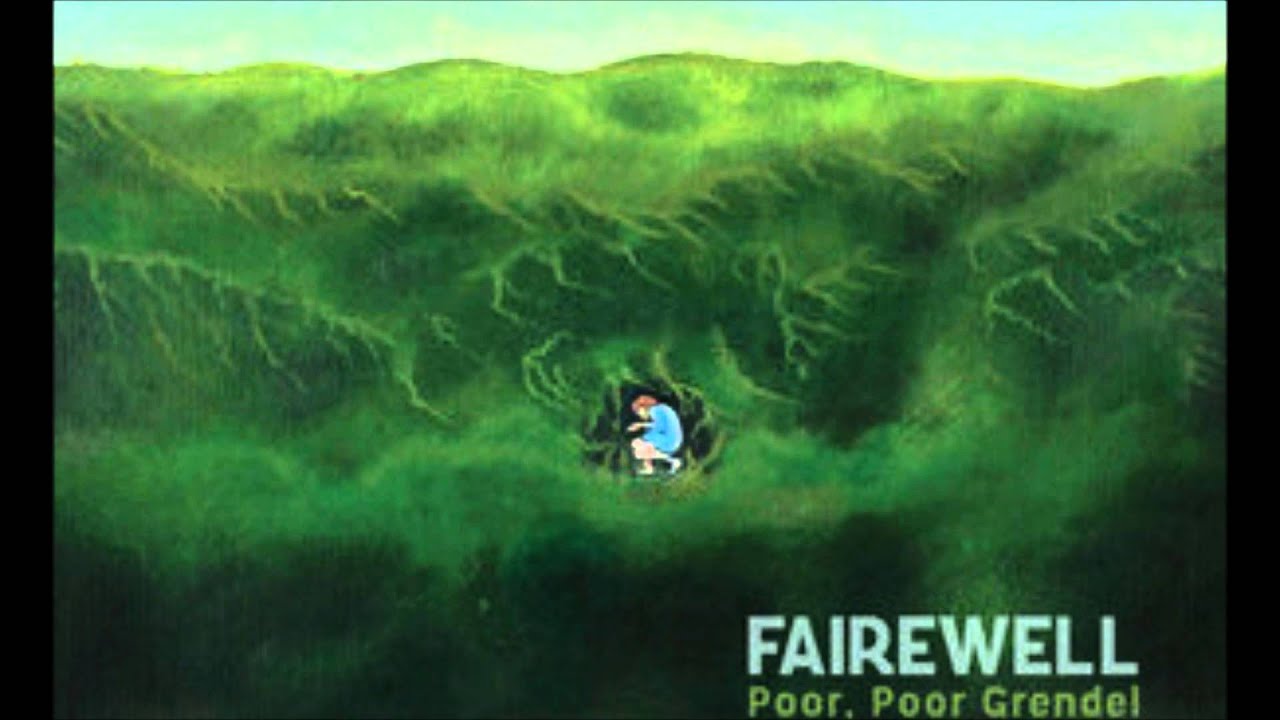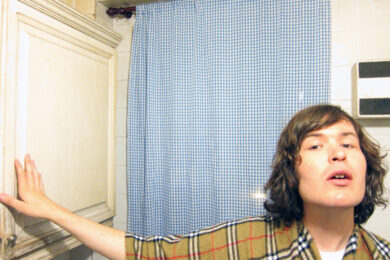Maybe it should’ve been expected from someone whose music has been described by others as “sounding like memory”. To interview Johnny White – the real name of Fairewell, who signed to Sonic Cathedral last year – is to be drawn into a conversational world of half-thoughts, unfinished ideas and vague nostalgia. Reflecting upon it afterwards, it’s hard not to wonder whether, amidst the garden path sentences and wistful ponderings, you’ve really come away with what it is that the 27 year-old really sees in his music.
Put simply, White is not the sort of character who can tell you why that treatment was placed on that vocal, or what he wanted to convey by this lyrical reference – for him, music just simply is. Searching for meaning in his debut LP Poor, Poor Grendel with him, you’re left with long but ambiguous answers that sometimes seem like they’re getting somewhere, only to find a cul-de-sac, the artist doubting himself and backtracking. Lyrics are streams of consciousness, instrumental sections completed in the moment. Musically, this is a very good thing.
White was previously known for his work as The Rollercoaster Project, releasing an album through Dreamboat in 2005, then moving to London from his native Sheffield a year or so later. On record, he evokes a detached sense of place, a nomad trying to find his way to somewhere, while sonically he whips up a great expanse to try and discover it within. There’s a real melodic core to it too – we’re not dealing in purely post-rockisms here. Structurally, at least, Poor, Poor Grendel is more than capable of being succinct. We converse via instant online chat, at his request, a thoroughly enjoyable experience that lasts almost two hours, and one oddly captivating despite its frustrations. But then, after all, Fairewell’s just making music. Everything else can come into consideration afterwards.
Do you find interviews quite a pressurised environment?
Johnny White: No, they’re fine, I just feel self-conscious in person. I worry that the interviewer might realise that they actually really hate the music.
I gather Fairewell is a project that’s been a long time in the making.
JW: In a way. I used to do another band, and it’s all part of the same thing really. Everything has gone into it. In a sense it’s been going on since I started making music years ago, when I was 10 or 12.
The Rollercoaster Project, right? Was there a reason for the name change, a sense of outgrowing what the first stuff sounded like? Or was it something as simple as just needing a refresh?
JW: I don’t know. I wanted to change it for ages but the old label wouldn’t let me, and then I just decided last year that it was going to be a new thing and have a new name. It changes every time I do something though, there aren’t enough names that could accurately correlate with each overhaul – I’d need three or four a year, and that’s just impractical.
One of the things which strikes me about Poor, Poor Grendel and what I’ve listened to of The Rollercoaster Project is that your work has a fluidity to it, which I guess reflects in what you’ve just said about the names. It gives the impression in its sounds and lyrics of a nostalgia but – I guess similar to what someone like Bradford Cox would do – it uses the past in an attempt to understand and move forward.
JW: I got an early review of a RCP thing on a Canadian blog in 2004 or something that said it "sounded like memory" which is the best way of putting it for me. I like that idea of nostalgia as an attempt to move forward though. I don’t know who Bradford Cox is, but I’ll check them out.
You’ll probably know him as front man of Deerhunter or as Atlas Sound.
JW: Oh yeah, I know Atlas Sound! Well, I suppose it comes out of confusion. Not ‘at the modern world’, because how many other worlds have there ever been for anyone? Just the confusion that is life, and this weird unfulfillable yearning to go back to the kind of soupy dream or whatever constitutes your ‘memory.’ But I don’t actually know what I’m writing about.
Is there no intention as you go into writing a song? Some sort of active thought process into what it’s going to be about – at least to you if not the outside world?
JW: Ok, for example, ‘Others of Us.’ I just had the loop from a couple of years ago, then it made me think of a thing I always think, which is that there’s another me who lives on the train and I activate him when I get on the train – and then it all just came out. The intention is normally about five seconds away from actually writing it, if that makes sense.
I’ve never rewritten lyrics apart from the odd word, the meaning’s set in stone from the start and then it just all tumbles out. For ‘Born Under A Bad Sign’, I wrote the lyrics as I was recording them, it was only afterwards I noticed that it was kind of this weird thing about magical loneliness. I don’t explain any of this at the time to anyone though, it all happens on a non-verbal level so it’s easy for me to just reach inside and grab stuff out of my mind, if that makes sense. I’ve never worried about the songs in that way.
I guess that – from how you’ve just described it – the lyrics are stream of consciousness, which would explain why, in these big cinematic sounds you’ve made, you’re also referencing comparatively humdrum settings like being in Tesco, with no thought to match. Writing in such a way that you’re just ‘in the moment’, as it seems you are, do you now look back at Poor, Poor Grendel and feel that any of it came out unexpectedly?
JW: Some of it. ‘Honey Street’ was a total accident and it still surprises me how much of a ‘normal’ song it is. That was actually ‘In The Bleak Midwinter’, and then I cut it up and reversed it and then saw an old magazine in the studio which had the address ‘Honey Rd’ on the back and, again, that all tumbled out. I don’t know what motivated the decision to namecheck Tesco. Music draws different things out of me, all this stuff, I don’t really know what it is. At least it doesn’t unearth unsavoury political beliefs or global warming scepticism. It just brings out a load of stuff about being on trains.
At the risk of starting to sound like I’m psycho-analysing you, perhaps you’re quite a nomadic person?
JW: Well kind of. I’m not sure… Probably in some ways, although I like doing the same things every day and going to the same places. I have this sense of trying to escape all the time, although I think everyone has that. It’s the hilarious joke that ends with death! I might be nomadic. Nomadic in my mind anyway.
How long have you been in London since moving from Sheffield? What took you there?
JW: I’ve been here for about four years. I grew up around urbane middle-class Sheffield people (myself included) who either left or stayed, and the ones that stay sometimes narrow their horizons and pretend that they’re salt of the earth Yorkshire types, and if you move to London you’re a French Duke. I just wanted to get out.
To go back to Poor, Poor Grendel, I’d be interested to see if surroundings played a part in influencing the album.
JW: Well I suppose my influences are just everything. It’s a bad answer, but anything can get in there! Like the film Manhunter was a big influence… Everything really. Fairewell is just my way of ‘getting them’ – I was thinking that today on the bus. I want to ‘get them’ with it. I don’t know what that means but there was this voice in my head saying ‘if you don’t get them with this you’ll get this with this.
‘Get them’? As in expressing your understanding of your influences?
JW: I literally don’t know what it meant. I was just was thinking ‘I’m going to get them with this’ – not like harm them. I don’t know what it means at all.
What pushed you to reference Grendel?
JW: I just kind of felt affinity with him. I’m nothing like him obviously, not really, but I felt affinity. Then it just seemed like the obvious choice for the album because I was feeling very Grendel-like when the decision was taken, and then there was no way back from it. I don’t know really.
Have there ever been any ambitions at all for it?
JW: I don’t have ambitions. I just want to do it. I’m just happy it’s out.
Did you pay much attention to the response to it?
JW: Oh, yeah. Too much. Although I don’t really take it in when people like it. I suppose if I did, I might not have the urge to keep going so strongly. I mean, it’s done pretty well by my standards. I was pretty pleased with the bad review in one magazine.
Ok Johnny, so to finish up, tell me how you feel about taking Fairewell on the road, considering that it feels like a project that you yourself sometimes struggle to understand. Do you worry that you might be taking something live that you’ve not got a complete grasp on? Or is the live element going to be another piece of the journey?
JW: I worry about gigging all day long. I don’t really enjoy it. I like the actuality of being on stage but the rest is just pure fear and worry. Thinking of it now, I just think of a huge tangle of wires and having to get taxis with amps in them and feedback, and being in rooms in the daytime that don’t suit being in the daytime. Honestly, it worries me a lot. I don’t know how it’s going to work if I’m honest – Fairewell is my little personal non-verbal studio project. Seems like making a shoe into a jacket and putting it on stage, but we’ll see how it goes.
Poor, Poor Grendel is out now.
Fairewell plays at London’s Social on Monday 13th February, for what may be his last live performance ever.





